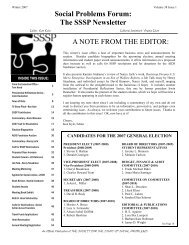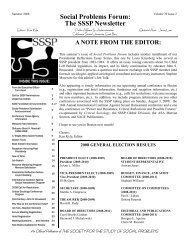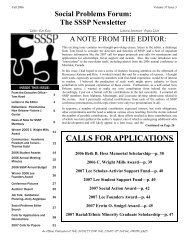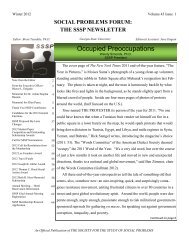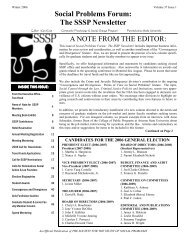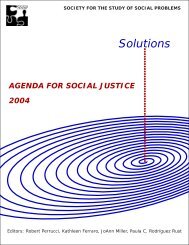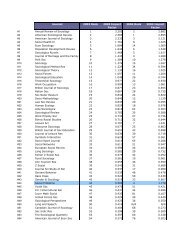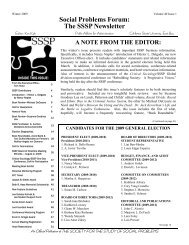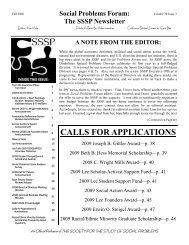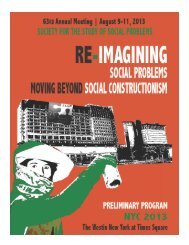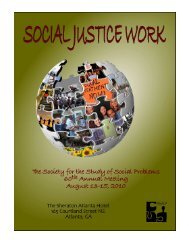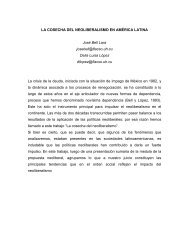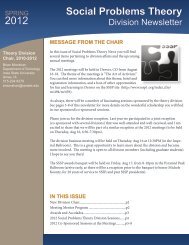in recognition of past and present service - Society for the Study of ...
in recognition of past and present service - Society for the Study of ...
in recognition of past and present service - Society for the Study of ...
You also want an ePaper? Increase the reach of your titles
YUMPU automatically turns print PDFs into web optimized ePapers that Google loves.
Sunday, August 11, 12:30pm<br />
THEMATIC<br />
Session 150: Identity: Reth<strong>in</strong>k<strong>in</strong>g Ethnicity <strong>and</strong> Race <strong>in</strong> <strong>the</strong><br />
21st Century<br />
Room: Imperial<br />
Presiders:<br />
Description:<br />
Pamela Yates, Film Director<br />
Paco de Onís, Skylight Pictures<br />
Sponsor:<br />
Organizer &<br />
Presider:<br />
Description:<br />
Racial <strong>and</strong> Ethnic M<strong>in</strong>orities<br />
Crystal L. Jackson, Loyola University Chicago<br />
The session will beg<strong>in</strong> by consider<strong>in</strong>g how whites <strong>and</strong> blacks<br />
make sense <strong>of</strong> <strong>the</strong>ir racial identities amid chang<strong>in</strong>g historical<br />
circumstances. Presenters will focus upon how whites’ lived<br />
experiences <strong>in</strong> racially chang<strong>in</strong>g neighborhoods <strong>in</strong><strong>for</strong>m <strong>the</strong>ir<br />
racial underst<strong>and</strong><strong>in</strong>g. With<strong>in</strong> <strong>the</strong> context <strong>of</strong> ongo<strong>in</strong>g dialogues on<br />
racial progress, <strong>the</strong> session will also take a new look at <strong>the</strong><br />
discrepancy between <strong>the</strong> achievements <strong>of</strong> middle class blacks<br />
<strong>and</strong> <strong>the</strong>ir lived experiences, which tend to <strong>of</strong>fer dim<strong>in</strong>ish<strong>in</strong>g<br />
returns on social <strong>and</strong> economic ga<strong>in</strong>s. In <strong>the</strong> second part <strong>of</strong> <strong>the</strong><br />
session, we exp<strong>and</strong> <strong>the</strong> discussion to <strong>in</strong>clude groups that lie<br />
outside <strong>the</strong> black/white paradigm that has def<strong>in</strong>ed American<br />
society historically. Presenters will exam<strong>in</strong>e how racial projects<br />
impact<strong>in</strong>g both Muslim <strong>and</strong> Mexican Americans <strong>in</strong><strong>for</strong>m social<br />
life. We end <strong>the</strong> session by tak<strong>in</strong>g <strong>in</strong>to account how globalization<br />
shapes identity <strong>and</strong> conceptions <strong>of</strong> home with<strong>in</strong> two segments<br />
<strong>of</strong> <strong>the</strong> Korean diaspora.<br />
Papers:<br />
“White Racial Wisdom: Whites Who’ve Lived Through Racially<br />
Chang<strong>in</strong>g Neighborhoods Reflect on Race,” Hea<strong>the</strong>r M. Dalmage,<br />
Michael T. Maly <strong>and</strong> Nancy Michaels, Roosevelt University<br />
“The Black Middle Class: New Insights <strong>for</strong> <strong>the</strong> <strong>Study</strong> <strong>of</strong> Racial <strong>and</strong><br />
Ethnic Inequality <strong>in</strong> <strong>the</strong> United States,” Courtney S. Thomas,<br />
V<strong>and</strong>erbilt University<br />
“Race, Ethnicity <strong>and</strong> Religion: Locat<strong>in</strong>g <strong>and</strong> Label<strong>in</strong>g<br />
Discrim<strong>in</strong>ation <strong>and</strong> Prejudice by Muslims <strong>in</strong> America,” Saher<br />
Selod, Simmons College<br />
“Mexicans <strong>in</strong> <strong>the</strong> United States: Processes <strong>of</strong> Racialization <strong>and</strong><br />
Racial Realities,” Joshua G. LePree, University <strong>of</strong> Colorado at<br />
Boulder<br />
“Liv<strong>in</strong>g <strong>in</strong> Lim<strong>in</strong>ality: Ethnic identity construction <strong>in</strong> <strong>the</strong> space<br />
between home <strong>and</strong> <strong>the</strong> homel<strong>and</strong>,” Helene K. Lee, Dick<strong>in</strong>son<br />
College<br />
Session 151: Granito: How to Nail a Dictator<br />
Room: Booth<br />
Sponsor:<br />
Organizer &<br />
Presider:<br />
Program Committee<br />
Graham Cassano, Oakl<strong>and</strong> University<br />
75<br />
Granito: How to Nail a Dictator is a story <strong>of</strong> dest<strong>in</strong>ies jo<strong>in</strong>ed by<br />
Guatemala’s <strong>past</strong>, <strong>and</strong> how a documentary film <strong>in</strong>tertw<strong>in</strong>ed with<br />
a nation’s turbulent history emerges as an active player <strong>in</strong> <strong>the</strong><br />
<strong>present</strong>. In Granito our characters sift <strong>for</strong> clues buried <strong>in</strong> archives<br />
<strong>of</strong> m<strong>in</strong>d <strong>and</strong> place <strong>and</strong> historical memory, seek<strong>in</strong>g to uncover a<br />
narrative that could unlock <strong>the</strong> <strong>past</strong> <strong>and</strong> settle matters <strong>of</strong> life <strong>and</strong><br />
death <strong>in</strong> <strong>the</strong> <strong>present</strong>. Each <strong>of</strong> <strong>the</strong> five ma<strong>in</strong> characters whose<br />
dest<strong>in</strong>ies collide <strong>in</strong> Granito are connected by Guatemala’s <strong>past</strong>. In<br />
1982, Guatemala was engulfed <strong>in</strong> an armed conflict dur<strong>in</strong>g which<br />
a genocidal “scorched earth” campaign by <strong>the</strong> military killed<br />
nearly 200,000 Maya people <strong>and</strong> disappeared ano<strong>the</strong>r 20,000.<br />
Now, as if a watchful Maya god were weav<strong>in</strong>g back toge<strong>the</strong>r<br />
threads <strong>of</strong> a story unraveled by <strong>the</strong> passage <strong>of</strong> time, <strong>for</strong>gotten by<br />
most, our characters become <strong>in</strong>tegral to <strong>the</strong> overarch<strong>in</strong>g<br />
narrative <strong>of</strong> wrongs done <strong>and</strong> justice sought that <strong>the</strong>y have<br />
pieced toge<strong>the</strong>r, each add<strong>in</strong>g <strong>the</strong>ir granito, <strong>the</strong>ir t<strong>in</strong>y gra<strong>in</strong> <strong>of</strong><br />
s<strong>and</strong>, to <strong>the</strong> epic tale. (length: 103 m<strong>in</strong>utes)<br />
SPECIAL<br />
Session 152: Theoriz<strong>in</strong>g Social Problems - L<strong>in</strong>k<strong>in</strong>g Research<br />
<strong>and</strong> Social Work Practice<br />
Room: Broadway I<br />
Sponsor:<br />
Organizers:<br />
Presider:<br />
Description:<br />
Program Committee<br />
Søren Kristiansen, Aalborg University<br />
Maria Appel Nissen, Aalborg University<br />
Søren Kristiansen, Aalborg University<br />
This session focus on <strong>the</strong> <strong>in</strong>ter-connections between social work<br />
practice, research <strong>and</strong> <strong>the</strong> <strong>the</strong>oriz<strong>in</strong>g <strong>of</strong> social problems. The aim<br />
<strong>of</strong> <strong>the</strong> session is, on <strong>the</strong> basis <strong>of</strong> a selection <strong>of</strong> diverse empirically<br />
grounded research projects - some <strong>of</strong> which are conducted<br />
with<strong>in</strong> <strong>the</strong> field <strong>of</strong> social work or among welfare state<br />
pr<strong>of</strong>essionals - to identify <strong>in</strong>sights <strong>and</strong> constructs that may prove<br />
useful <strong>in</strong> terms <strong>of</strong> <strong>the</strong>oriz<strong>in</strong>g contemporary social problems; <strong>in</strong><br />
develop<strong>in</strong>g social work practice <strong>and</strong> <strong>for</strong> re-imag<strong>in</strong><strong>in</strong>g <strong>the</strong> l<strong>in</strong>ks<br />
between social work practice, research <strong>and</strong> <strong>the</strong>oretical<br />
conceptualizations <strong>of</strong> social problems.<br />
Papers:<br />
“The sociological sense <strong>of</strong> social problems <strong>in</strong> social work<br />
practice,” Maria Appel Nissen, Aalborg University<br />
“Capacity development as <strong>the</strong> answer to social problems,” Mia<br />
Arp Fallov, Aalborg University<br />
“What is poverty? A study <strong>of</strong> <strong>the</strong> factors affect<strong>in</strong>g <strong>the</strong> judgement<br />
<strong>of</strong> poverty by future welfare state pr<strong>of</strong>essionals,” Merete<br />
Monrad, Aalborg University



